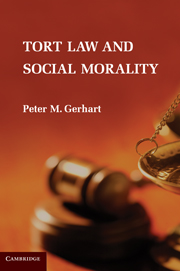4 - Kantian Duty
Published online by Cambridge University Press: 04 August 2010
Summary
The theory of social morality that provides the foundation for social cohesion turns on an interpretation of Kantian metaphysics that bears some elaboration. The Kantian conception of duty is fully congruent with the theory of other-regarding behavior advanced here. For Kant, social morality – that is, the morality of decisions that affect others in the community – involves an assessment of the attitude one person ought to have concerning the well-being of others in order to be moral. Although Kant focused on the deontological content of duty, and was explicit that to be moral the obligation to think in a certain way about one's behavior may not depend on the consequences of undertaking that thought, he did not deny that consequences are relevant to deriving the maxims that should guide behavior. Although Kant spent little time dealing with the application of his moral theory, and left it to others to determine how an actor accounts for consequences when an actor seeks to fulfill his duty to think appropriately about the well-being of others, his deontological concept of duty is fully consistent with the obligations of the other-regarding person.
To complete the system of Kantian ethics described in this chapter, the next chapter draws on Rawls's concept of the veil of ignorance as an analytical device for determining what consequences matter and how they matter to a person who would make moral decisions.
- Type
- Chapter
- Information
- Tort Law and Social Morality , pp. 74 - 90Publisher: Cambridge University PressPrint publication year: 2010



